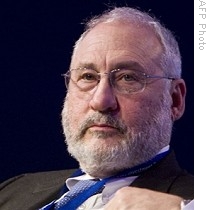Bangkok
21 August 2009
 |
| Joseph E. Stiglitz (file photo) |
Joseph Stiglitz says Asia's economies are in a good position to reduce their dependence on exporting goods to the United States and Europe.
Speaking at a conference in Bangkok Friday, Stiglitz said he was upbeat over the economic outlook for the region. After slumping along with most other economies, Asian markets are rallying and some economies are expanding again, aided by government stimulus efforts.
He said they should look more to the regional and domestic markets to boost growth.
"Asia's recovery has been remarkable. People are talking about a 'V' shaped recovery," he said. "The big issue that it raises is can Asia decouple from the West - the U.S. and Europe? You have a robust large economy here in Asia and so you have the basis of developing a regional economy."
Stiglitz, who won the Nobel Prize for economics in 2001, said that to protect economies, there needs to be global cooperation in regulating markets.
He criticized the management of the U.S. financial system and the deregulation of markets, which he said "brought instability and risk without return."
"The crisis is a failure of capitalism, American style. And it shows that the presumptions on which that kind of capitalism was based have not worked," he said. "In my mind it highlights the need for a balanced role of the state - a balance between the market, the state, and NGOs [non-government organizations] and other actors in society."
He also criticized the U.S. government's multibillion dollar rescue of the leading banks. Stiglitz says the rescue packages benefited companies and stock holders, but did little to help average Americans.
Stiglitz advocated shifting away from using the dollar as the dominant global reserve currency. He says the dollar is "not a good store of value" given the high public debt and uncertain economic outlook in the U.S.
Thai Prime Minister Abhisit Vejjajiva also addressed the conference, calling for the creation of an international institution to regulate global financial markets. He said that emerging economies should have a greater voice in multilateral financial institutions such as the World Bank.
The Thai economy is facing a contraction of three to four percent this year. But Mr. Abhisit says the outlook will improve later in the year.